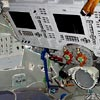
|
|
| news | mission HQ | about mark | experiments | galleries | letters | timeline | iss sightings |
GeneralQuestion: When did you first decide that you wanted to go to space? Answer: It's been a dream as long as I've known that space was out there. Space technology is fascinating to me, and it's wonderful to be training and learning and working with it every day. Question: What preparations have you made for the flight? Answer: I came to Russia, went through some crazy medical tests, started training with the cosmonauts and negotiating with some companies and the space agency here in Russia. After several months, we finally signed a contract, and then we invited South African scientists to develop the science programme that I will conduct during the flight. Question: You have reportedly paid $20-million for the flight. Don't you think that's expensive? Answer: It's a lot less than most countries would pay to have an astronaut in training and sent on a flight assignment. We negotiated the best price for the package, and I knew when I was coming here what that was likely to be. Question: Have you met Dennis Tito, the first civilian to fly to space? If so, what kind of advice did he give you for the trip? Answer: He's a very tenacious person, and I was very impressed when I met him that he had worked so hard to achieve his dream. He didn't give me much advice, since we were approaching the experience in a very different way, and I think my experience here has been very different to his. The fact that he had done this already made it easier to think about coming here when the project was very uncertain. Question: What training have you done at Star City, and what part of the training has been the most difficult? Answer: We train on the simulators of the Soyuz spacecraft and the International Space Station, so that we will be ready to fly on them when the day comes. We also have some physical training, and some training to survive landing anywhere in the world, from deserts to jungles and even the open sea. And then we have a lot of theoretical training about spaceflight, ballistics, rocketry and so on. And lots of Russian language lessons. Question: What are you planning to put in your "suitcase"? Answer: I'll have lots of science equipment, some photos of home and friends, and some music. Question: What do you think you're going to do when you'll be on the ISS? Answer: I'm taking four South African science experiments, as well as one Russian experiment, which will keep me busy while up there. As well as a camera and videocamera to be able to bring back some memories of the time while up there. Question: What do you expect your time on the ISS to be like? Answer: I've seen many photos, and lots of video footage shot in space. But all the astronauts say that nothing can prepare one for the first feeling of being out of the atmosphere, having literally left the world for a while. So I'll wait to see exactly what it all feels like. Question: Do you hope to achieve something greater with your mission, or is it just a personal adventure? Answer: It's a personal challenge and adventure, and it's an opportunity to make science and mathematics alive for learners in South Africa, where I was raised. Question: In terms of your interest in space, what do you plan to do when you return to Earth, as it were? Answer: There are already a number of groups working on space tourism. I'm not really interested in space tourism, but I think they are on the tip of opening a huge market, because there are many people who tell me they would love to share in this experience, and I hope that they will soon be able to do just that. |
|
|||||||||||||||||||||||||||||||||||||||||||||||||||||||||||||||||||||||||||||||
 |
All original content © HBD, All Rights Reserved. Please credit www.africaninspace.com for any original images or content you source from this website. Links do not represent endorsements. All comments / suggested references and images are copyrighted by their posters. Project managed by Interactive Africa. Internet Engineering by Deimos Information Engineering. |




